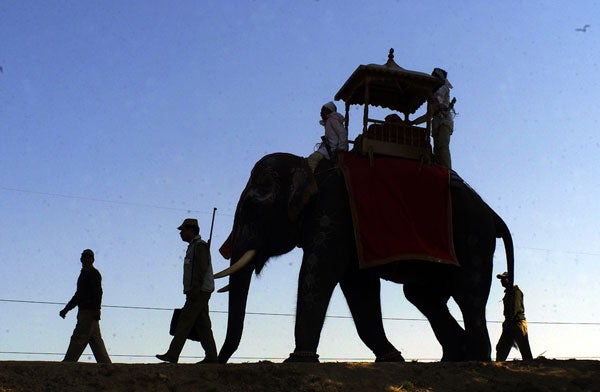The Elephant's Journey, By Jose Saramago, trans. Margaret Jull Costa

Your support helps us to tell the story
From reproductive rights to climate change to Big Tech, The Independent is on the ground when the story is developing. Whether it's investigating the financials of Elon Musk's pro-Trump PAC or producing our latest documentary, 'The A Word', which shines a light on the American women fighting for reproductive rights, we know how important it is to parse out the facts from the messaging.
At such a critical moment in US history, we need reporters on the ground. Your donation allows us to keep sending journalists to speak to both sides of the story.
The Independent is trusted by Americans across the entire political spectrum. And unlike many other quality news outlets, we choose not to lock Americans out of our reporting and analysis with paywalls. We believe quality journalism should be available to everyone, paid for by those who can afford it.
Your support makes all the difference.The year before José Saramago's untimely death in June was among the most prolific of his intensely active literary life. The Portuguese Nobel laureate was "supposed to have died" from organ failure 18 months earlier, and this book is dedicated to his wife: "To Pilar, who wouldn't let me die". It is the most folkloric – fairy-tale rather than whimsical – of the output won by cheating death. Typically, the other books are each in a different genre: Small Memories is a childhood memoir; A Notebook is a blog of sorts; and Cain, yet to appear in English, the kind of legendary novel in which Saramago has specialised, alternating angry with celebratory passions.
There the resemblances begin. Increasingly, Saramago refused to discriminate between fact and fiction, memoir and myth. Not for nothing in Iberia is the same word – historia – used for both a story and history. So this imaginative tale of an elephant's journey from Lisbon to Vienna in 1551, accompanied by his Goan mahout Subhro (who changes name to Fritz en route), is larded with real cathedrals and royals and eventful episodes, many far more fantastical than the imposing miracles the great pachyderm is called upon to perform en route.
There can be no doubting Saramago's love of animals: they (particularly his dogs) have appeared regularly in his books, and in A Notebook he launched a campaign for Susi, the maltreated cow elephant in Barcelona Zoo. In June 2009, he also recorded how, together with companions, he followed the elephant Solomon's tracks on "an arbitrary itinerary", the idea being "to go away...[and] weave a story out of our travels". The Elephant's Journey takes up the tale, tongue firmly in cheek, spuriously explaining that the Archduke Maximilian – the fortunate recipient of such a giant gift from King João III of Portugal – "decided to make such a journey at this time of year, but that's how it is set down in history, as an incontrovertible, documented fact, supported by historians and confirmed by the novelist..."
Intentionally, it is the diversions that make the voyage so worthwhile. Saramago's favourite preoccupations, his love of politics and loathing of religion (and his strictures on each), are reiterated through the words of Subhro: born a Hindu, baptised a Christian, a pacifist and philosopher. Syncretism is all, as the Holy Trinity is redesigned as a Quartet (to include the Blessed Virgin Mary). The miraculous birth and resurrection of Ganesh marks him out as truly Christ-like; and Brahma and God, if not identical, at least are on speaking terms.
But it is Solomon (or Suleiman) the elephant who remains the hero: "painfully lifting his heavy legs, one, two, one, two" through heat or snow, never lapsing either physically or morally, even during Subhro's (now Fritz's) lamentable fall from grace as he succumbs to temptation. So the story will forever win out over history as "thanks to the inexhaustible generosity of the imagination, we erase faults, fill in lacunae as best we can, forge passages through blind alleys, and invent keys to doors that have never even had locks". Saramago may damn history as "one long succession of missed opportunities" but here he has seized every possible opening to turn an unlikely tale of a transalpine hike into something far larger even than its elephantine subject.
Amanda Hopkinson is professor of literary translation at the University of East Anglia
Join our commenting forum
Join thought-provoking conversations, follow other Independent readers and see their replies
Comments